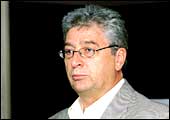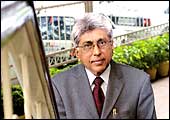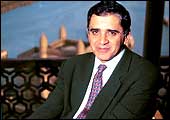|
It's
getting impossible to keep Rana Talwar out of the headlines.
Within days of announcing a hi-profile merger of his Centurion
Bank with the Bank of Punjab, Talwar has announced that he's joining
hands with a subsidiary of Singapore's Temasek to launch an India-focussed
fund. Its proposed size? A whopping $3-5 billion (Rs 13,200-22,000
crore) in another five years. The proposal is now with the Foreign
Investment Promotion Board for approval, but this will be Talwar's-former
Group CEO of Standard Chartered and son-in-law of DLF's K.P. Singh-second
attempt at cracking the burgeoning asset managing market in India.
The first attempt failed because the man Talwar's Sabre Capital
had picked to lead the fund (Samir Arora) fell foul of SEBI (but
was subsequently cleared on appeal). Apparently, retired bankers
just don't go away. They keep coming back with ever bigger plans.
 Back
On Mint Street Back
On Mint Street
Rakesh
Mohan's second stint at the finance
Ministry has proved to be just nine months long. Early this month,
the Princeton-trained economist abruptly resigned as Secretary,
Department of Economic Affairs, and returned to the Reserve Bank
of India as its Deputy Governor. What happened? Mohan couldn't
be reached for comment, but the buzz in North Block is that he
may have been unhappy at not getting the Finance Secretary's job,
despite it being promised to him. Instead, Mohan was entrusted
with more administrative work that the economist in him didn't
quite relish. Delhi's loss, Mumbai's gain.
Meeting The Troops
 First
week of July, Unilever's CEO of two months, Patrick Cescau,
came on a low-profile visit to India. The four-day trip, which
included stopovers at the Mumbai headquarters and Bangalore, was
meant for the benefit of Hindustan Lever's newly restructured
team, now led by Harish Manwani. One doesn't know what Cescau,
57, said by way of pep talk to Manwani and his team, but he must
have been reassured by signs of growth at HLL after two years
of stagnancy. But Manwani still has to work on the bottom line,
which dropped 15 per cent last quarter. First
week of July, Unilever's CEO of two months, Patrick Cescau,
came on a low-profile visit to India. The four-day trip, which
included stopovers at the Mumbai headquarters and Bangalore, was
meant for the benefit of Hindustan Lever's newly restructured
team, now led by Harish Manwani. One doesn't know what Cescau,
57, said by way of pep talk to Manwani and his team, but he must
have been reassured by signs of growth at HLL after two years
of stagnancy. But Manwani still has to work on the bottom line,
which dropped 15 per cent last quarter.
 Found
In Translation Found
In Translation
In
May 2004, when Gitanjali Kirloskar, wife of Toyota Kirloskar
Vice Chairman Vikram Kirloskar, launched the Indo-Japan Initiative
(IJI), an entity that she hoped would "connect minds" across the
two cultures, it seemed one of those things that corporate wives
do. This, despite the fact that the Kirloskar Group boasts successful
joint ventures with Toyota. Since then, IJI has held seminars,
in association with the likes of nasscom and FICCI, and countless
events focussing on the softer side of the Indian culture targeted
at the Japanese: workshops on how to wear the sari, for instance.
Now, Kirloskar, who already heads FICCI's Indo-Japan cell has
been asked by the Confederation of Indian Industry to oversee
all Japan-oriented activities of the India Brand Equity Fund,
an initiative aimed at improving India's branding in global markets.
"It is suprising how little we know about each other," she says,
referring to India and Japan. If the lady has her way, that will
change.
Booster Shot
 It's
a testament to Indian Pharma's growing influence in the world
markets. On June 22, Dilip Shah, Secretary General of the
Indian Pharmaceutical Alliance and CEO of Vision Consulting, took
over as Chairman of the Toronto-based International Generic Pharmaceutical
Alliance (IGPA). It took India years of fighting to get a seat
in the four-member IGPA in 2002, but since then the local drug
manufacturers have been growing in influence. So what is Shah's
agenda for his two-year term? "To continue to fight Big Pharma,"
he says, but adds that IGPA will also work closely with governments
to ensure the "prevention of intellectual property abuse, longer
market exclusivity" and a stronger generics body. With the Indian
generics industry accounting for more than 12 per cent of global
generics sales of $48 billion (Rs 2,11,200 crore), Indian Pharma
must be hoping to make the most of Shah's stint at IGPA. It's
a testament to Indian Pharma's growing influence in the world
markets. On June 22, Dilip Shah, Secretary General of the
Indian Pharmaceutical Alliance and CEO of Vision Consulting, took
over as Chairman of the Toronto-based International Generic Pharmaceutical
Alliance (IGPA). It took India years of fighting to get a seat
in the four-member IGPA in 2002, but since then the local drug
manufacturers have been growing in influence. So what is Shah's
agenda for his two-year term? "To continue to fight Big Pharma,"
he says, but adds that IGPA will also work closely with governments
to ensure the "prevention of intellectual property abuse, longer
market exclusivity" and a stronger generics body. With the Indian
generics industry accounting for more than 12 per cent of global
generics sales of $48 billion (Rs 2,11,200 crore), Indian Pharma
must be hoping to make the most of Shah's stint at IGPA.
-Contributed by Kushan Mitra, Ashish
Gupta and R. Sridharan
|





 Back
On Mint Street
Back
On Mint Street F
F Found
In Translation
Found
In Translation I
I